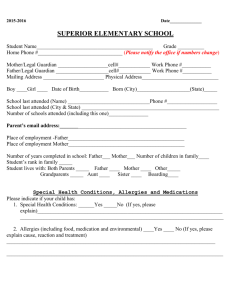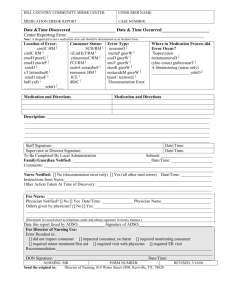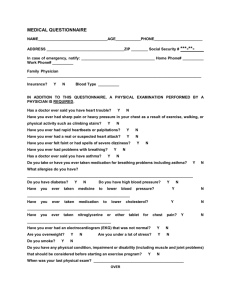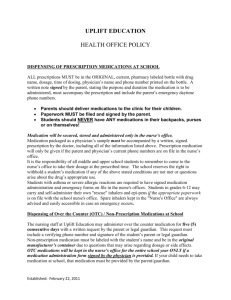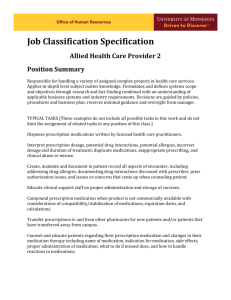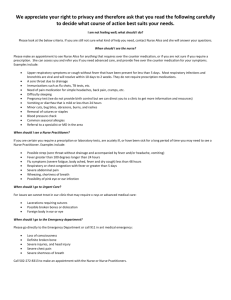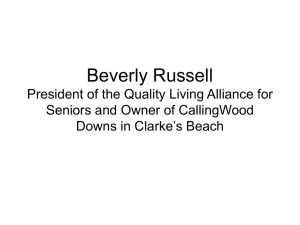Health Office Policy
advertisement
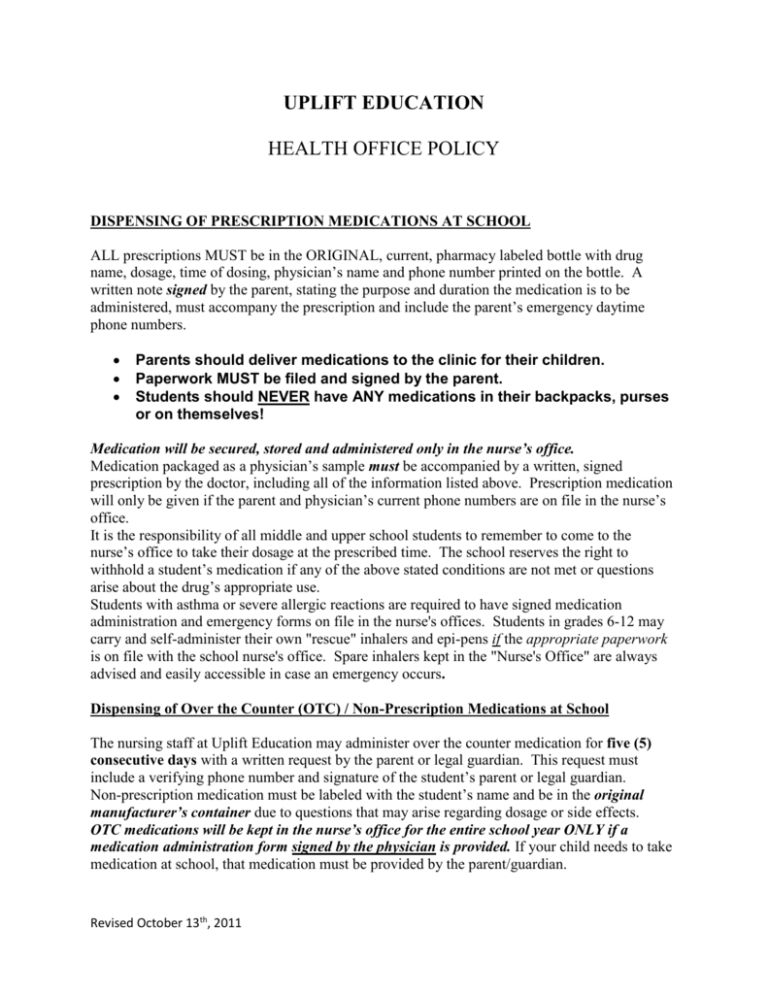
UPLIFT EDUCATION HEALTH OFFICE POLICY DISPENSING OF PRESCRIPTION MEDICATIONS AT SCHOOL ALL prescriptions MUST be in the ORIGINAL, current, pharmacy labeled bottle with drug name, dosage, time of dosing, physician’s name and phone number printed on the bottle. A written note signed by the parent, stating the purpose and duration the medication is to be administered, must accompany the prescription and include the parent’s emergency daytime phone numbers. Parents should deliver medications to the clinic for their children. Paperwork MUST be filed and signed by the parent. Students should NEVER have ANY medications in their backpacks, purses or on themselves! Medication will be secured, stored and administered only in the nurse’s office. Medication packaged as a physician’s sample must be accompanied by a written, signed prescription by the doctor, including all of the information listed above. Prescription medication will only be given if the parent and physician’s current phone numbers are on file in the nurse’s office. It is the responsibility of all middle and upper school students to remember to come to the nurse’s office to take their dosage at the prescribed time. The school reserves the right to withhold a student’s medication if any of the above stated conditions are not met or questions arise about the drug’s appropriate use. Students with asthma or severe allergic reactions are required to have signed medication administration and emergency forms on file in the nurse's offices. Students in grades 6-12 may carry and self-administer their own "rescue" inhalers and epi-pens if the appropriate paperwork is on file with the school nurse's office. Spare inhalers kept in the "Nurse's Office" are always advised and easily accessible in case an emergency occurs. Dispensing of Over the Counter (OTC) / Non-Prescription Medications at School The nursing staff at Uplift Education may administer over the counter medication for five (5) consecutive days with a written request by the parent or legal guardian. This request must include a verifying phone number and signature of the student’s parent or legal guardian. Non-prescription medication must be labeled with the student’s name and be in the original manufacturer’s container due to questions that may arise regarding dosage or side effects. OTC medications will be kept in the nurse’s office for the entire school year ONLY if a medication administration form signed by the physician is provided. If your child needs to take medication at school, that medication must be provided by the parent/guardian. Revised October 13th, 2011 NO aspirin will be given to students. The nurse keeps no medications of any kind in stock. ANY student found taking medication or giving medication to another student will be subject to school disciplinary action, subject to review by the dean of schools or other school administrator to determine appropriate consequences. Asthma Medication Send all inhalers with the pharmacy prescription label attached directly on the inhaler. Also, please send the nurse a copy of the student’s “Asthma Action Plan” as devised by your child’s physician. If your student has any activity restrictions due to weather or exertion, please, send a doctor’s note specifying this with the physician’s signature included. For the health and safety of the student, and so the nurse can monitor their condition, it is advised that all school asthma medication be stored and administered in the nurse’s office. Equipment for nebulization is available in the nurse’s office. Parents must provide the tubing and mask or mouthpiece. All inhalers for students in Kindergarten through 5th grade must be stored and administered in the nurse’s office. Severe Allergic Reaction Medication must be kept with the physician’s written consent in the nurse’s office for a student with a known hyper-allergic reaction. Ensure that the nurse is aware of any student’s hypersensitivities to food / environment / insects. (Examples of medication include Benadryl in a lotion or pill form, Epi-pen, or topical creams.) An “Allergy Action Plan” is advised to be completed for any student with a known history of anaphylactic reaction and is available under the forms section of the school’s website. Self-Administration of Medication Students in grades 6-12 with diabetes, asthma or anaphylactic reactions may carry and selfadminister their rescue medications if the appropriate paperwork (Diabetes Care Plan, Asthma Action Plan or Allergy Action Plan signed by their physician) is on file in the nurse’s office. Spare insulin, inhalers and epinephrine kept in the Nurse’s Office are always advised and easily accessible in case an emergency occurs. Revised October 13th, 2011 Fever A fever is an oral temperature of 100.4 degrees or higher or, greater than 99.4 degrees under the arm. Students should not be medicated to reduce a fever and sent to school. Students MUST be fever free for 24 hours after the temperature has returned to normal (98.6) without the use of analgesics before attempting to return to school. Students should NOT be sent to school with medication “to take after they eat lunch”. Immunizations In addition to routine immunizations, new State requirements are as follows for all Kindergarten and 7th grade students. If your child is going into Kindergarten: MMR Vaccine (Measles, mumps and rubella) – Required two dose for Kindergarten Hepatitis A Vaccine- Required two dose for Kindergarten If your child is going into 7th Grade: Meningococcal Vaccine – Required for 7th Grade Varicella Vaccine – Required two doses for 7th Grade Tdap Vaccine (Tetanus and diphtheria toxoids and acellular pertussis) – Required booster dose for 7th Grade PLEASE NOTE, these immunizations are required for your child to have before the start of the 20112012 School Year. Please visit the nurse’s website for updated immunization requirements by the state of Texas or visit the State website at http://www.dshs.state.tx.us/immunize/school. Revised October 13th, 2011
